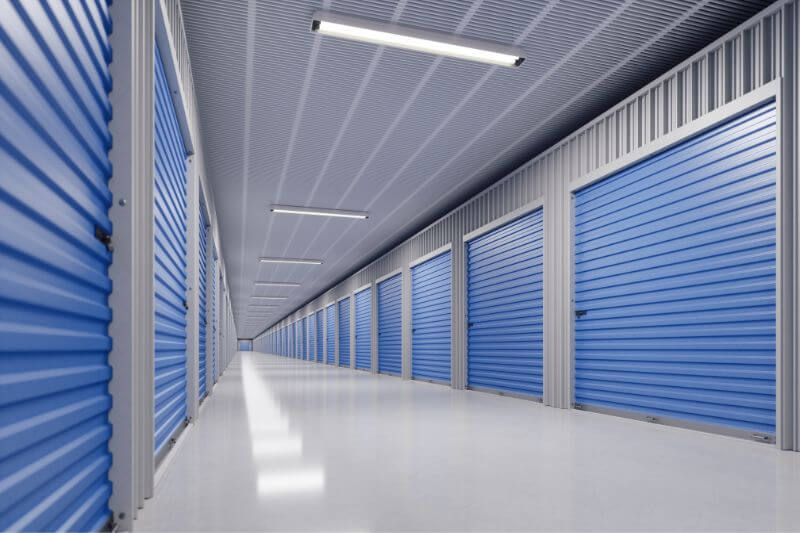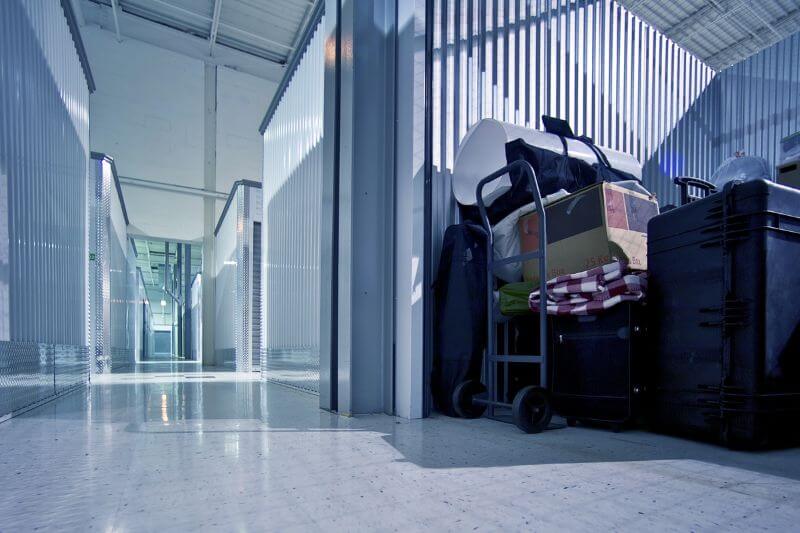What items need climate controlled storage? Various businesses will appear when you look for self-storage solutions and advertise climate-controlled facilities. Climate-controlled storage units come in only a few sizes and are typically more expensive than regular storage facilities. Nevertheless, they are beneficial, particularly if you plan to preserve items for an extended time or store a specific type of item. Additionally, if you store items in an environment with excessive humidity, heat, or cold, they are recommended.
Your things can experience a lot of damage while they are being stored. The most frequent concerns, understandably enough, are pests, excessive temperatures, and moisture buildup. Therefore, how can you ensure that the items you pick up are in the same condition as the ones you dropped off? Climate control is the answer.
In this blog post, we’ll go over the basics of climate-controlled storage and the items that need to be kept in this type of unit.

What is Climate Controlled Storage?
A type of storage unit in Scottsdale specifically built to maintain constant temperatures and humidity levels is known as climate controlled storage, commonly known as temperature-controlled storage. A temperature between 55 and 85 degrees Fahrenheit will usually stay constant. It’s worth checking if a drive-up or outdoor storage facility has climate-controlled storage, as these are often only found in storage facilities with inside storage units.
Because they combine to produce moisture, humidity, and temperature are crucial factors for maximizing the climate of space. While greater humidity indicates more heat within the air (and decreased humidity means lesser heat), more heat and greater humidity equals more moisture. It prevents moisture from forming and keeps items safe when the temperature and humidity are consistent and controlled.

12 Items That Need Climate Controlled Storage
Many items require extra care when storing, especially those sensitive to humidity and temperature changes. These items require storage that is climate-controlled. These ten items need storage in a climate-controlled facility.
Wooden Furniture
Over time, excessive moisture exposure can cause wood to rot, distort, or crack. It makes climate-controlled storage vital for anyone storing wooden furniture, including bed frames, chairs and tables, end tables, entertainment centers, dressers, nightstands, and more.
Not only is the climate controlled when you have climate control, but the humidity is also. The key to preserving wooden furniture inside a Scottsdale self-storage unit is to keep the humidity under control. The less humidity there is, the better.
Leather Furniture
Since leather is susceptible to temperature fluctuations, living in a place with frequent and severe seasonal weather changes might be problematic.
Temperature control is a crucial safety precaution for expensive leather items, even if you’re storing them in an area without significant temperature changes throughout the year. Not storing leather in a climate-controlled space makes it more prone to moisture, which may discolor the leather and lead to mildew.
Leather, wood, and special collections keep them protected.
Upholstery Furniture
Upholstery furniture, including sofas, chairs, and other padded pieces, can significantly benefit from climate-controlled storage. This type of furniture is particularly susceptible to environmental changes due to the materials used in its construction:
- Fabric and Padding: Both fabric and padding can absorb moisture, leading to mold and mildew growth. Humidity control prevents these issues, keeping the furniture in pristine condition.
- Odor Absorption: Fabric upholstery can easily pick up odors from the environment. A controlled climate helps maintain a neutral atmosphere, preventing unwanted smells from seeping into the furniture.
- Wood and Metal Frames: Many upholstered items also contain wood or metal frames, which can warp or rust if exposed to fluctuating temperatures and humidity.
Household Appliances
Appliances like refrigerators, ovens, microwaves, dishwashers, washers, and dryers require climate-controlled storage in high-heat or cold areas. It’s done so that temperature control can prevent both mechanical and electronic parts from rusting and breaking, which could result in permanent damage.
Climate control can help prevent mold and mildew growth within appliances, even though you must completely clean and dry them (and remove any water hoses) before storing them.
Special Collections
Keeping special collections and preserving particular items for the future is the purpose of collecting them. Temperature control may help in this preservation. All items, including wine collections, stamps, coins, and comic books, must be kept in a climate-controlled space to avoid damage from humidity and temperature changes.
Coins
Coins should be stored with their temperature and humidity as close as possible. The oxidation process that destroys the metals applied to coins can be caused by prolonged exposure to high humidity and temperatures.
In particular, silver and copper are susceptible to tarnish. Toning is a destructive force that eventually renders the coin dark, even if some collectors find it enjoyable.
Stamps
Keeping a stamp collection within a climate-controlled storage unit is crucial if you reside in an area with consistently high humidity.
Two crucial factors are the temperature and humidity level. Never would I keep a collection in a non-climate-controlled space. Stamps will curl and adhere if subjected to high temperatures and humidity.
Your collection will be harmed by careless storage and maintenance, which will eventually cause it to lose value.
Comics
Comic book pages are prone to damage, just like stamp album ones, if left in an area where moisture might seep in.
Safely storing your comics is critical to the longevity of your collection. If the collection is expanding, storage facilities make an excellent option for home storage.
Since comic books—typically the rarer and older ones—cannot withstand moisture, it is a good idea to maintain your collection by establishing a climate control unit that will minimize humidity.
Wine
Temperature changes can quicken the aging process of wine and provide a metallic, oxidized taste. It would be a nightmare for collectors who have spent a lot of time and money building their wine collections for their wines to rot from incorrect storage.
The biggest mistake is storing wine in an area lacking a steady, cool temperature.
What is the ideal temperature to store wine? It is advised to keep the temperature between 55 and 57°F.
Musical Instruments
Storing your musical instruments, even though they might be rather large, is highly fragile and should be handled with extreme caution. Temperature control is essential whether instruments are stored for a short or extended time.
Percussion
Let’s examine the storage of a typical piano to illustrate the proper way to store a percussion instrument. It requires extra care because it’s also a string instrument. Extreme humidity and temperatures may quickly harm pianos, causing the keys, strings, and wooden exterior to become ruined eventually.
A piano’s deadliest enemy is humidity. Since a typical piano has about 15,000 glued joints, the glue will lose effectiveness if kept in a humid environment. Furthermore, the strings are by no means resistant to rust. They could rust and corrode if not kept in a climate-controlled space.
A piano’s form and condition can be impacted by temperature, so having a Scottsdale climate-controlled storage unit is essential. For instance, if it’s constructed of wood, the wood can expand or shrink according to the temperature.
Strings
The acoustic guitar is A string instrument susceptible to temperature and humidity damage. Like a piano, if not appropriately kept, its strings could break. Additionally, high temperatures can seriously harm the glues and adhesives used to hold the instrument together.
The ideal range of temperatures is 72–77°F with 45–55% relative humidity. When in doubt, never store an instrument within a space where you wouldn’t feel at ease sleeping.
Brass
Brass instruments, like trumpets, can suffer damage from exposure to extreme heat and humidity. Climate control is especially crucial in humid, hot environments since it speeds up the growth of bacteria and trumpet corrosion.
Long-term storage of a trumpet can cause problems, even if a trumpet that has been oiled, cleaned, and packed properly is usually not impacted by weather. Extreme temperatures cause some of the materials used in trumpets to degrade. Certain trumpet materials, such as felt, rubber, and cork, could degrade more quickly in certain conditions.
Woodwind
To preserve woodwind instruments, one must maintain humidity levels.
Woodwind and other wooden instruments have a sweet spot humidity range of 40–55%, which presents storage risks. If the humidity level is below 40%, the wood elements of the instrument may shrink and eventually cause cracking. It’s also possible for the parts to become ill-fitting and challenging to play.
Humidity levels exceeding 55 percent should also concern musicians who keep woodwind instruments such as flutes, oboes, and clarinets. Excessive dampness may cause the instrument’s pads to swell and expand. In severe cases, the moisture within the instrument may cause mold to grow.
Artwork
The best places to store art tools and artwork are in climate-controlled spaces, whether original frescoes or creations inspired by Pinterest.
Keeping art in storage. It is crucial to maintain the temperature of your unit even if you store artwork in file drawers or diameter tubes, as you should. A temperature between 70 and 75°F and approximately 50% humidity are ideal.
Supplies for crafts also require climate control. Since all fabric needs to be shielded from moisture and UV rays, storing spare fabric or completed sewing projects in a climate-controlled unit is ideal. Additionally, it is advised to store items in clear plastic containers to keep moisture and dust out.
Like sewing machines, crafting equipment can also benefit from some TLC or gentle climate management. A constant temperature benefits sewing machines since the belts within can contract and expand in response to severe temperatures.
Clothing
Climate-controlled storage helps preserve your clothing, whether storing a bridal gown or switching out summer outfits for sweaters. Maintaining humidity levels within your unit after you’ve washed everything thoroughly is a crucial stage in clothes storage that shouldn’t be overlooked.
When storing clothing, the last thing you want is mildew and mold to get a hold of, especially if the items are left alone for several months. While keeping moisture out of your clothes can also be achieved by placing plastic storage bins over cardboard boxes, climate control is the best way to keep fabrics dry.
Business Inventory & Documents
Storage units are advised for businesses like real estate firms that must file and store many documents.
It makes no difference how you store files—in cabinets or boxes—when it comes to file storage. A climate-controlled unit is the only thing separating humidity and documents—which discolor, fade, or dissolve when exposed to moisture.
Any business that stores inventory can benefit from climate control as well. That is because using a climate-controlled unit is the most straightforward approach to maintaining the quality of the products that your business plans to sell.
Photos
Climate control is essential for photo storage. Protect your memories by using albums or boxes that have successfully passed the Photographic Activity Test (PAT) and storing them in a climate-controlled environment.
Additionally, prints may fade and merge in an area where photographs are stacked over one another if temperatures get too high. For this reason, even within albums, keep pictures facing away from one another.
Electronics
You may pack your storage unit with pricey items when storing electronics, such as computers, TVs, and recording equipment. Using climate control, you may lessen the possibility of damaging your electronics as they are being stored.
TVs should feature climate control, especially if they are kept in areas with frequent temperature changes. Temperatures at the extremes of the thermometer are harsh on plasma TV panels and interior components.
However, severe temperature changes are not the only thing that can harm electronics. Since humidity is the enemy of all professional audio equipment, climate control is a compelling argument.
While it could be effective in the short term to store electronics within a typical storage container, over time, moisture that builds up due to growing humidity levels may cause an impact akin to a direct water spill. The wiring can fail, and internal parts can rust.
Valuable or Sentimental Items
Items that hold significant monetary or sentimental value demand extra care and protection, making climate-controlled storage essential:
- Antiques and Heirlooms: Temperature and humidity fluctuations can damage delicate antiques, including wooden furniture, jewelry, and textiles. Controlled environments help preserve their integrity and extend their lifespan.
- Photographs and Documents: Paper products, such as photographs, important documents, and books, are highly sensitive to moisture and temperature changes. Climate-controlled units prevent deterioration, yellowing, and mold growth.
- Art and Collectibles: Artwork, especially pieces created with organic materials like canvas and paint, requires stable conditions to avoid cracking, fading, or warping. Similarly, collectibles from various materials can be better preserved in a regulated environment.
Conclusion
In conclusion, climate-controlled storage units offer the ideal solution for preserving delicate items sensitive to temperature and humidity fluctuations. Whether you store antiques or collectibles, a climate-controlled self-storage unit ensures that your valuable belongings remain pristine over time. Additionally, memorabilia such as vintage items, vinyl records, and tapes benefit greatly from these units’ stable environment. Furthermore, film and cameras, which can be particularly susceptible to damage from moisture and extreme temperatures, are well-protected in a climate-controlled setting. By maintaining stable temperatures and humidity levels, these units protect your treasured possessions, ultimately providing peace of mind and safeguarding your investments.
Reserve your Scottsdale Climate Controlled Storage Unit Today!
You can store your climate-controlled items at McDowell Mountain Community Storage, located in our Scottsdale facilities. You can store wine, artwork, furniture, luggage, electronics, and other stuff in our storage facilities. Contact us immediately to reserve your storage unit!
FAQs: What Items Need Climate Controlled Storage?
1. What is climate-controlled storage?
Climate-controlled storage is a specialized unit that maintains a consistent temperature (typically between 55°F and 85°F) and humidity level. This prevents damage to stored items caused by temperature fluctuations and excess moisture.
2. Why do I need climate-controlled storage?
Climate-controlled storage is essential for items sensitive to humidity and temperature changes, helping to prevent damage such as mold, warping, rust, or fading.
3. What types of furniture require climate-controlled storage?
Wooden, leather, and upholstery furniture should be stored in climate-controlled units to protect them from moisture and temperature changes, which can cause cracking, rotting, or mildew.
4. Are there specific appliances that need climate control?
Yes, household appliances like refrigerators, washers, and dryers should be kept in climate-controlled environments to avoid damage to electronic and mechanical parts.
5. What about valuable collections?
Noteworthy collections benefit from climate-controlled storage, including stamps, coins, comic books, and wine. Fluctuations in temperature and humidity can easily damage these items.
6. Do musical instruments require climate control?
Yes, musical instruments such as pianos, guitars, and brass instruments need climate-controlled storage to prevent damage from humidity and temperature changes, which can affect their materials and sound quality.
7. How does climate-controlled storage protect clothing?
Climate control helps preserve clothing by preventing mold and mildew growth, especially for delicate items like wedding gowns or seasonal clothing stored for an extended period.
8. Is climate-controlled storage necessary for business inventory and documents?
Absolutely. Climate control protects sensitive documents and inventory from moisture, which can cause discoloration, fading, or damage, ensuring that business assets remain in good condition.
9. What precautions should I take when storing electronics?
Store electronics in climate-controlled units to prevent moisture buildup, which can cause rust and internal damage. Ensure items are clean and dry before storage.
10. How can I ensure my valuable or sentimental items are safe?
Store valuable items like antiques, photographs, and collectibles in climate-controlled environments to maintain their condition and prevent deterioration caused by temperature and humidity changes.


